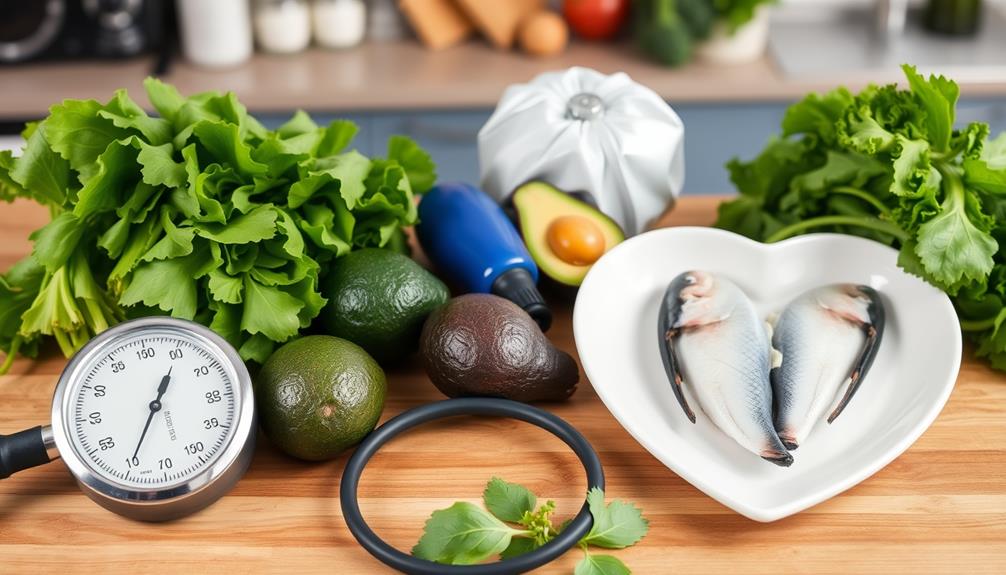On a keto diet, aim for about 20-25% of your daily calories from protein, which typically equals 1.2-2.0 grams per kilogram of your body weight. Eating too little can cause muscle loss and low energy, while too much may kick you out of ketosis through gluconeogenesis. Finding the right balance depends on your activity level and goals. Keep monitoring your body’s response—if you’re curious about fine-tuning your intake, there’s more to explore.
Key Takeaways
- Most keto diets recommend 20-25% of daily calories from protein to support muscle and energy needs.
- Consuming excessive protein can lead to gluconeogenesis, potentially disrupting ketosis.
- Too little protein risks muscle loss, fatigue, and decreased metabolic function.
- Distribute protein evenly across meals to optimize utilization and maintain stable blood sugar levels.
- Adjust protein intake based on individual goals, activity level, and body response for optimal ketosis.

Have you ever wondered how protein fits into a ketogenic diet? It’s a common question, especially since balancing your macronutrients is key to maintaining ketosis. Protein plays a essential role, but how much you need depends on your goals, activity level, and dietary preferences. When planning your meals, pay close attention to meal timing because consuming protein at strategic times can support muscle preservation and energy levels without knocking you out of ketosis. For instance, spreading your protein intake evenly throughout the day helps your body utilize it more efficiently. Eating a large amount in one sitting might spike insulin or slow digestion, so small, frequent servings are often better. If you’re following a plant-based ketogenic diet, you’ll want to explore plant-based options that are rich in protein but still low in carbs, such as tofu, tempeh, seitan, or certain nuts and seeds. Incorporating these into your meal timing can help you meet your daily protein needs without relying on animal products.
Understanding how much protein is enough or too much is essential. Too little protein might cause muscle loss or energy dips, especially if you’re active or trying to build muscle. Too much, on the other hand, can kick you out of ketosis because excess amino acids can be converted into glucose through a process called gluconeogenesis. This is why tracking your intake and paying attention to your body’s response is vital. For most people on keto, aiming for about 20-25% of daily calories from protein strikes a good balance. You can adjust based on how you feel, your weight, and your activity levels. If you’re highly active or strength training, you might need a bit more.
For those embracing plant-based options, it’s important to combine different protein sources to get a complete amino acid profile, especially since many plant proteins are incomplete. Combining foods like nuts, seeds, and legumes throughout the day ensures you hit your protein goals without overdoing carbs. Meal timing becomes even more important here because plant-based proteins often come with fiber and carbs, so spacing them out across your meals helps manage digestion and keeps your ketosis intact. Additionally, understanding how high-quality projectors can improve your viewing experience can motivate you to optimize your home cinema setup. Remember, listening to your body is key. If you notice energy drops or cravings, it might be time to tweak your protein intake or meal timing. Ultimately, finding the right balance of protein on keto requires a little experimentation, but with mindful planning, you can stay in ketosis while meeting your dietary preferences and nutritional needs.
Frequently Asked Questions
Can Too Much Protein Kick Me Out of Ketosis?
Yes, eating too much protein can kick you out of ketosis. When you consume excess protein, your body increases protein absorption, leading to gluconeogenesis, where amino acids convert to glucose. This process can surpass your ketosis threshold, raising blood sugar levels and inhibiting fat burning. To stay in ketosis, it’s best to moderate your protein intake, focusing on keeping it within recommended levels for your body and activity level.
Is Plant-Based Protein Better Than Animal Protein on Keto?
Choosing between plant-based protein and animal protein on keto is like selecting your favorite flavor of ice cream—you’ll enjoy both, but each has unique benefits. Plant-based protein sources are often easier to digest and contain fiber, while animal proteins are complete and rich in essential amino acids. Ultimately, it depends on your goals and preferences. Both can fit into a keto diet, so pick what best supports your lifestyle.
How Do I Know My Ideal Protein Intake on Keto?
To find your ideal protein intake on keto, start with a protein calculation based on your weight, activity level, and goals. Generally, keto guidelines recommend about 0.6 to 1.0 grams of protein per pound of lean body mass. Adjust as needed, paying attention to how your body responds. Tracking your intake and progress helps guarantee you’re not overdoing it, supporting ketosis and your overall health.
Does High Protein Intake Affect Kidney Health on Keto?
High protein intake can impact your kidney health by stressing kidney function and increasing protein metabolism. You might worry about kidney damage, but if your kidneys are healthy, moderate high protein levels usually aren’t a problem. Stay attentive to your body’s signals, stay within recommended limits, and consult your healthcare provider if you have kidney concerns. Protect your kidneys, support your health, and enjoy your keto journey responsibly.
Can Protein Help With Muscle Preservation During Keto?
Yes, consuming enough protein helps with muscle preservation during keto. It supports muscle retention by promoting protein synthesis, which prevents muscle breakdown. When you include adequate protein in your diet, you guarantee your body has the building blocks it needs to maintain muscle mass, even while in ketosis. Just be mindful not to overdo it, as too much protein can interfere with ketosis, but enough will help you stay strong and lean.
Conclusion
Remember, finding the right protein amount on keto is like tuning a fine instrument—you want just enough to keep everything in harmony. Too much can kick you out of ketosis, while too little may leave you feeling drained. Listen to your body’s signals and adjust accordingly, like a sailor steering through shifting winds. With balance, you’ll navigate your keto journey smoothly, reaching your goals without hitting any hidden reefs along the way.









